
Agnès Varda was a Belgian-born French film director, screenwriter and photographer.

The New Wave, also called the French New Wave, is a French art film movement that emerged in the late 1950s. The movement was characterized by its rejection of traditional filmmaking conventions in favor of experimentation and a spirit of iconoclasm. New Wave filmmakers explored new approaches to editing, visual style, and narrative, as well as engagement with the social and political upheavals of the era, often making use of irony or exploring existential themes. The New Wave is often considered one of the most influential movements in the history of cinema.
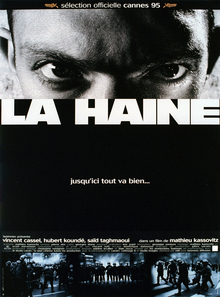
La Haine is a 1995 French social thriller film written, co-edited, and directed by Mathieu Kassovitz. Starring Vincent Cassel, Hubert Koundé and Saïd Taghmaoui, the film chronicles a day and night in the lives of three friends from a poor immigrant neighbourhood in the suburbs of Paris. The title derives from a line spoken by one of them, Hubert: "La haine attire la haine!", "hatred breeds hatred". Kassovitz was awarded the Best Director prize at the 1995 Cannes Film Festival.
James Fotopoulos is an independent filmmaker whose work is low-budget and rigorous, and consists of experimental narrative features, non-narrative shorts, and video installations. He began creating his film projects as a teenager in 1993, and as of 2012, has made over 100 films and videos.
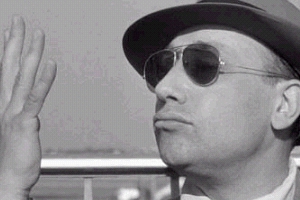
Jean-Pierre Grumbach, known professionally as Jean-Pierre Melville, was a French filmmaker. Considered a spiritual father of the French New Wave, he was one of the first fully-independent French filmmakers to achieve commercial and critical success. His works include the crime dramas Bob le flambeur (1956), Le Doulos (1962), Le Samouraï (1967), and Le Cercle Rouge (1970), and the war films Le Silence de la mer (1949) and Army of Shadows (1969).

Two or Three Things I Know About Her is a 1967 French New Wave film written and directed by Jean-Luc Godard, one of three features he completed that year. As with the other two, it is considered both socially and stylistically radical. Village Voice critic Amy Taubin considers the film to be among the greatest achievements in filmmaking.

Jules and Jim is a 1962 French New Wave romantic drama film directed, produced and co-written by François Truffaut. Set before, during, and after World War I, it follows a tragic love triangle involving French bohemian Jim, his shy Austrian friend Jules, and Jules' girlfriend and later wife Catherine.
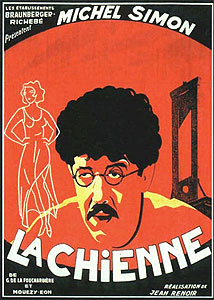
La Chienne is a 1931 French film by director Jean Renoir. It is the second sound film by the director and the twelfth film of his career. The film is based on the eponymous story "La Chienne" by Georges de La Fouchardière. The literal English translation of the film's title is "The Bitch", although the movie was never released under this title. It is often referred to in English as Isn't Life a Bitch? The film was remade by Fritz Lang in the United States as Scarlet Street (1945).
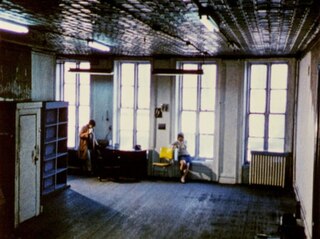
Wavelength is a 1967 experimental film by Canadian artist Michael Snow. Shot from a fixed camera angle, it depicts a loft space with an extended zoom over the duration of the film. Considered a landmark of avant-garde cinema, it was filmed over one week in December 1966 and edited in 1967, and is an example of what film theorist P. Adams Sitney describes as "structural film", calling Snow "the dean of structural filmmakers."
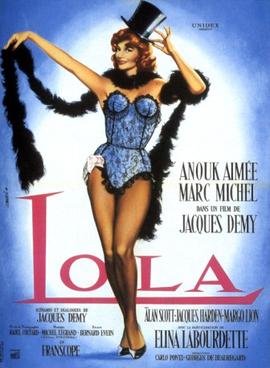
Lola is a 1961 romantic drama film written and directed by Jacques Demy as a tribute to director Max Ophüls, described by Demy as a "musical without music". Anouk Aimée stars in the title role. The film was restored and re-released by Demy's widow, French filmmaker Agnès Varda.
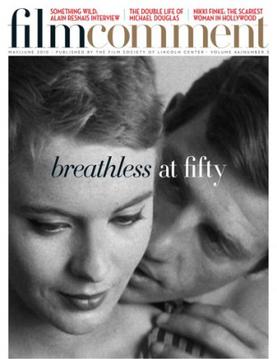
Film Comment is the official publication of Film at Lincoln Center. It features reviews and analysis of mainstream, art-house, and avant-garde filmmaking from around the world. Founded in 1962 and originally released as a quarterly, Film Comment began publishing on a bi-monthly basis with the Nov/Dec issue of 1972. The magazine's editorial team also hosts the annual Film Comment Selects at the Film at Lincoln Center. Due to the COVID-19 pandemic, publication of the magazine was suspended in May 2020, and its website was updated on March 10, 2021, with news of the relaunch of the Film Comment podcast and a weekly newsletter.

Le Bonheur ("Happiness") is a 1965 French drama film directed by Agnès Varda. The film is associated with the French New Wave and won two awards at the 15th Berlin International Film Festival, including the Jury Grand Prix.

La Pointe Courte is a 1955 French drama film directed by Agnès Varda. It has been cited by many critics as a forerunner of the French New Wave, with the historian Georges Sadoul calling it "truly the first film of the nouvelle vague". The film takes place in Sète in the south of France. The Pointe Courte is a tiny quarter of the town known as the fisherman's village.
Ginette Vincendeau is a French-born British-based academic who is a professor of film studies at King's College London.

Jean-Michel Basquiat: The Radiant Child is a 2010 documentary film directed by Tamra Davis. It crosscuts excerpts from Davis' on-camera interview with the artist Jean-Michel Basquiat and anecdotes from his friends and associates. The film was shown at the Sundance Film Festival in 2010.

One Sings, the Other Doesn't is a 1977 French film written and directed by Agnès Varda that focuses on the lives of two women over 14 years against the backdrop of the Women's Movement in 1970s France.
Microscope Gallery is a contemporary art gallery located at 525 West 29th Street, New York, NY 10001. It was founded by artists and curators Elle Burchill and Andrea Monti and opened in September 2010 in Bushwick, Brooklyn, NY. The gallery specializes in time-based works, particularly film, sound, digital and performance art. Sculpture, installation, painting, mixed media and photographic works are also regularly shown at Microscope.
The 54th New York Film Festival was held September 30 - October 16, 2016.
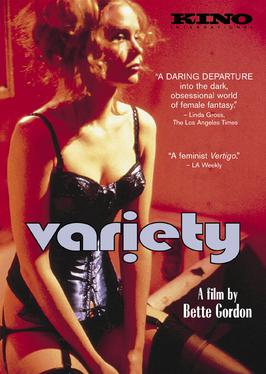
Variety is a 1983 American drama film directed by Bette Gordon with a screenplay by Kathy Acker from a story by Gordon. The film stars Sandy McLeod, Will Patton, and Richard M. Davidson. The film follows a young woman who takes a job at a New York City pornographic theater and becomes increasingly obsessed with a wealthy patron who may or may not be involved with the mafia.

Faces Places is a 2017 French documentary film directed by Agnès Varda and JR. It follows the pair as they travel around rural France creating portraits of the people they meet. The film was screened out of competition at the 2017 Cannes Film Festival, where it won the L'Œil d'or award, and released on 28 June 2017 in France, and on 6 October 2017 in the United States. At the 90th Academy Awards, the film was nominated for Best Documentary Feature.
















